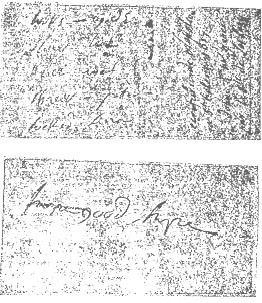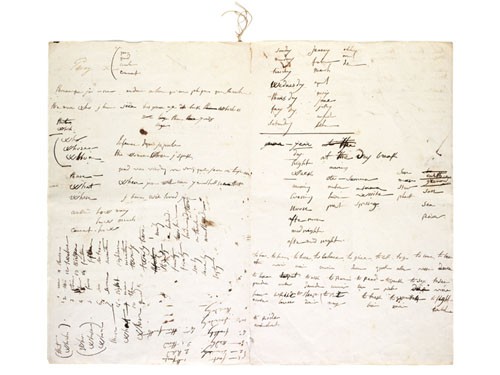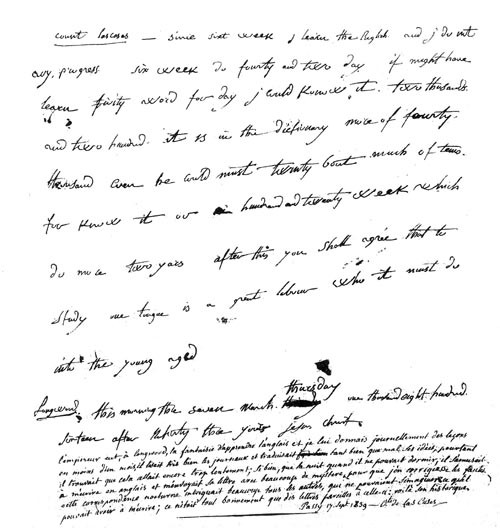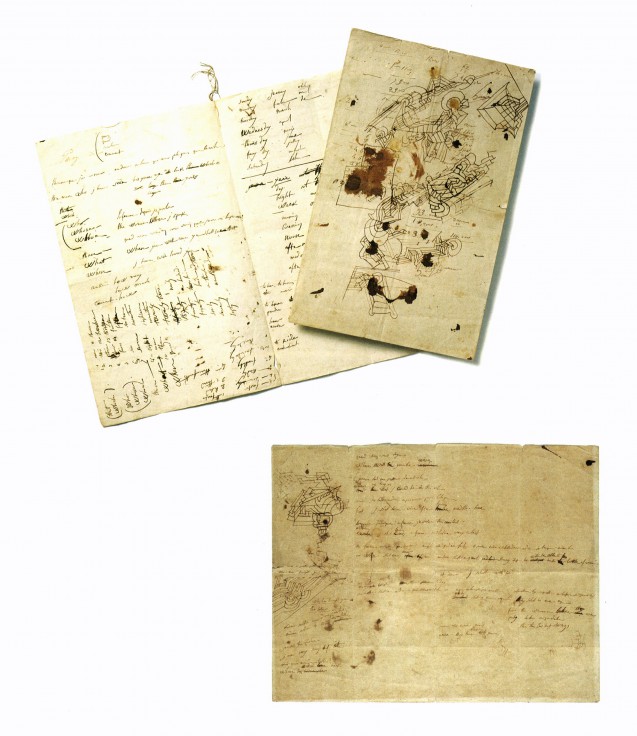In addition to the two languages he spoke from a young age (French and Italian), it appears that Napoleon set about also learning English. The details come from Count Emmanuel de Las Cases’s Mémorial of the fallen emperor’s stay on St Helena. (1) Napoleon first expressed an interest during the two-month voyage of banishment from Europe in 1815 onboard Northumberland. The Count gave him his first two lessons when the vessel stood off Funchal, Madeira, 23-25 August, 1815. (2) However, since most of the ship’s officers spoke French, the experiment was to be interrupted until the beginning of the following year when the ‘court’ was finally settled on the island of St. Helena at Longwood House. On Tuesday the 16th of January, 1816, almost three months to the day after their setting foot on the island, the master and his servant had (so Las Cases would have us believe) the following conversation: “At about three o’clock, the Emperor summoned me for conversation while he was washing and dressing. We then took a few turns around the garden. He happened to remark by chance that it was scandalous that he could not yet read English. I assured him that if he had continued, following on from the two lessons which I had given to him off Madeira, he would today read every sort of English book. He admitted that it was true and then ordered me to force him to take a lesson every day.” The first lesson on the island thus took place the following day. Las Cases again (17 January): “Today the Emperor took his first English lesson. Since my main aim was to make him able to read the newspapers without difficulty, this first lesson consisted only in making him acquainted with an English gazette, getting him to study the form and the way it was organised, showing him that the position of the different sorts of content was always the same, helping him to distinguish between the advertisements and the town gossip and the politics, and teaching him how, with the latter, to judge what was authentic and what was simply an unsubstantiated rumour. I set myself the goal that he would, in a month, be able to read the newspapers without the assistance of any of us – if the Emperor could bear the irritation of such lessons every day. The Emperor then wanted to try a few translations into English: he wrote down some expressions from dictation and translated them into English, using both a small table of auxiliary verbs and the articles (which I had made for him) and a small dictionary for the other words – which I had him look up himself. I explained to him the rules of syntax and grammar as they came up. He wrote a few phrases of a sort, which he enjoyed much more than the translations into French which we also tried. After the lesson, at about two o’clock, we went into the garden.”
 A fragment bearing exercises from this sort of lesson was once held in Belgium, by a certain Mr Gasc, secretary general of the company Cockerill, Belgium in 1931. (3) It was given by Las Cases to Mr Gasc’s grandfather, presumably when Las Cases lived in Belgium after his expulsion from St Helena at the end of 1816. It was published for the first time by Paul Dechamps in the Revue des études napoléoniennes. The text reads “looks: regard; Slow: lent; Heavi: pesant, Threw: jetter; Locked: serra; gone out: aller dehors, sortir; Opened: ouvert; to see: voire (sic), regarder; hope, good hope.”
A fragment bearing exercises from this sort of lesson was once held in Belgium, by a certain Mr Gasc, secretary general of the company Cockerill, Belgium in 1931. (3) It was given by Las Cases to Mr Gasc’s grandfather, presumably when Las Cases lived in Belgium after his expulsion from St Helena at the end of 1816. It was published for the first time by Paul Dechamps in the Revue des études napoléoniennes. The text reads “looks: regard; Slow: lent; Heavi: pesant, Threw: jetter; Locked: serra; gone out: aller dehors, sortir; Opened: ouvert; to see: voire (sic), regarder; hope, good hope.”

A much larger, more detailed fragment is however preserved in the collection of the Fondation Napoléon. (4) It came into the possession of Madame Bertrand, who gave it to Mme Junot. The latter’s grand-daughter, Mme de la Ferrière, revealed its existence by lending it to an exhibition held in Paris in 1895, the Exposition historique et militaire de la Révolution et de l’Empire. (5) It was subsequently owned by Madame Henry Olphe-Galliard, from Lyons, who lent it to a Napoleonic exhibition by the Bibliothèque de la ville de Lyon, organised by Monsieur Cantinelli sometime before 1921. Accounts of the document were published by J. G. Alger, Albéric Cahuet and Jules Dechamps. (6) The text consists of phrases written in French followed by their approximate translations in English. The notes are indicative of Napoleon’s attitude to his confinement (and he always wrote j – as in the French ‘je’ – instead of I). “Quand serez vous sage? – When will you be wise / jamais tant que je suis dans cette isle. Never as long as j should be in this isle / Mais je le deviendrai après avoir passé la ligne / But j shall become wise after having passed the line / Lorsque je débarquerai en France je serai très content – When j shall land in France j shall be very content…”. There are also some moving fragments concerning women, his son and his last pleasures: “my wife shall come near to me, my son shall be great and strong if he will be able to trink (sic) a bottle of wine at dinner j shall [toast] with him… / The women believe they [are] ever prety (sic) / The time has not wings / When you shall come, you shall see that j have ever loved you.”
Whilst Alger and Dechamps have assumed that this document was the result of lessons given by Grand Maréchal Bertrand’s wife, Fanny Bertrand (the document was apparently owned by her), internal evidence in the letter would seem to be against this, as noted by Cahuet in his article. On the left margin of folio 1 stand the phrases: “Who has brought you this letter. Madame S[k]elton is then departed, J am very sorry of it, When will she come back.” With the exception of Lady Malcom and Mrs Balcombe, Madame Skelton probably saw more of Napoleon on St Helena than any other British lady. Wife of the Lieutenant governor and previous resident at Longwood, she spoke excellent French and dined and visited with Napoleon six times, playing chess with him on her last visit, 11 May, 1816. This period of favour corresponds perfectly with the moment when Las Cases was teaching Napoleon English. There is no mention at this period of Madame Bertrand having given similar lessons. Indeed, Bertrand’s diary of the St. Helena period begins in April 1816 and before this time relations between Napoleon and Madame Bertrand were enormously strained as she continually refused to come to dine at Longwood, preferring the social ‘excitement’ of Jamestown.
Napoleon, on the other hand, was not to remain at the rudimentary level of mere sentences for long. On Sunday 28 January (a week and half after the previous passage regarding English lessons), Las Cases notes that Napoleon had continued to take regular lessons: “Our days passed,” he went on, “as anyone would imagine, in a gigantic and insipid monotony. Ennui, memories, and melancholy were our mortal enemies; work was our great, indeed our only refuge. The Emperor was exceedingly regular in his activities. English had become for him an important matter. Fifteen days earlier [in fact, eleven, ed.] he had taken his first lesson, and counting from that moment, a few afternoon hours every day were engaged in that study, sometimes with an application that was entirely admirable, sometimes with visible dislike; an alternation which made me particularly anxious. For I set the greatest store by his succeeding and I feared every day to see him abandon the efforts of the day before – that in the end I would be the cause of the greatest ennui and without the precious goal which I had set myself. But on the other hand, every day I was increasingly motivated, seeing my aim getting ever nearer. The Emperor’s acquisition of English was a real and significant victory. In the past, so he said, simple translations had cost him annually one hundred thousand ecus. Were his translators good appointments, he added? Were the translations faithful? Today we found ourselves imprisoned in the midst of this language, surrounded by its productions. All the great changes brought about, all the great questions which the Emperor had raised on the Continent had been discussed from the opposite point of view: there were so many new faces for the Emperor, which up to that point had remained for him inscrutable.
Added to that, books in French were rare for us, and those that were available the Emperor knew them all and had re-read them until he could re-read them no more, whilst on the other hand we could get ourselves many books in English, books indeed which were completely new to him. To sum up, the acquisition of a foreign language became a quality in his eyes, it was not only an ornament in itself, but also a real advantage. It facilitated negotiations and in a certain way was the beginning of a relationship for both of us. Nevertheless, I was beginning to notice an end to our difficulties; indeed I could almost see the moment when the Emperor would go beyond the inevitable dislike of the beginning. But imagine if you can what it must have been like for him – the schoolwork of learning conjugations, declensions, articles, etc. It would have been impossible without huge effort on the part of the pupil and real skill on the part of the teacher. He often asked me if he deserved the cane, suspecting that it had a good effect in schools. He would have got on much faster, he used to say laughingly, if he had had a cane to fear. He complained that he had not made any progress – but the progress he did make would have been enormous for anyone.
The larger, the swifter, the broader the spirit, the less likely it is to stop on detail, rules and minutiae. Despite the fact that he grasped extraordinarily easily the theory of the language, the Emperor had few gifts when it came to learning the mechanics of the tongue. He had an extraordinary intelligence but a very bad memory: (7) this latter particularly upset him. He felt that he was not improving. As soon as I was able to frame the words in question into a law or give a logical analogy for them, that law or analogy went in and was understood immediately. The pupil then would outstrip the teacher in the applications and consequences of the figure. But when it was simply a question of memorising and repeating mere words, it was a very difficult business. One word would be continually taken for another, and it would become too fastidious to enforce a strict regularity. Another difficulty was the fact that the same letters and vowels as in French required a completely different pronunciation: the pupil wished only to recognise our pronunciation: and the teacher would have doubled the problem of ennui if he had asked for more.
Finally the pupil, even in his own language, had a way of garbling proper nouns; as for foreign words, he pronounced them just as he pleased. Once they left his mouth, whatever way he had pronounced them, they remained forever that, because he had, once and for all, lodged them in his head in that way. And most of the English words he learned suffered precisely that fate, such that the teacher had to have the wisdom and patience to be happy with the situation, leaving it to the gradual passing of time to correct, if ever possible, all these incorrect things. Out of this situation arose a completely new language, one it must be said that was only understood by myself. But it brought the Emperor the ability to read English. And he could, more or less, have made himself understood in writing. That was already a great deal, indeed it was everything.”
However, more or less a week later (3-6 February, 1816), Las Cases was much more positive about the Emperor’s progress in English. “… the Emperor worked three, four, five hours at a time on his English; his progress was really very significant. Even he was struck at times and showed his happiness like a child. On one of these days, he said at table (and he repeated it frequently) that he owed this victory to me, and that it was a great one. But the only merit which I could claim in this (no different from that which I showed for the Emperor’s other tasks) was that I dared to give him the idea, that I kept returning to it, and that, once begun, I kept it up (at least as far as my part of the business was concerned) with a promptitude and daily regularity which in fact acted as his encouragement. If it happened that we were not ready when he asked for us and the matter had to be put off till the following day, dislike set in immediately and our work remained stationary until something came along which brought it up again. “I need to be pushed”, he said to me privately, during one of these temporary interruptions. “Only the pleasure of moving forward keeps me going. For, my dear man, and I’m sure you agree with me, nothing in all this is pleasurable. There is not one single happy word in our entire existence.”
And yet, the black mood was to disappear in March when Napoleon, now confident in his new found language, played a trick on Las Cases – who fell for it hook, line and sinker. In the chapter entitled ‘Mystification’, dated 7 March, 1816, the Count describes the incident: “just before dinner, I went as usual to the salon. The Emperor was having a game of chess with the Grand Maréchal. The footman on duty at the door to the salon came to me and gave me a letter: it was marked “very urgent”. Out of respect for the Emperor, I turned away so as to try to read the letter. It was in English. It said that I had written a very fine book, but that it was not free of faults, and that if I wanted to correct them in the next edition, the book would certainly be much better; yours sincerely, etc. Such a letter aroused my surprise and a little anger; I went a bit red in the face; so much so that I had not taken the time to look at the handwriting. When I looked at it, I recognised the hand, despite the unusual beauty of it, and I could not keep from laughing a great deal to one side. But the Emperor, who had a side view of me, asked me what was in the letter that I had received. I replied that it was a missive the initial effect of which was much different from the feeling with which it left me. I said this so naturally, since the mystification had been so complete, that he began splitting his sides laughing. The letter was from him. The pupil had wished to make fun of his teacher and to make a test at his expense. I kept this letter safe: the happiness, the style and the circumstances make it more precious than any diploma which the Emperor could have given at the time of his power.”
As a result of the great care which Las Cases took in keeping everything the Emperor gave him (almost as if they were relics), and since Las Cases’ papers still exist (in a private collection), this teasing letter in fact survives and the text reads as follows:
Sir Count Lascases
j write you this letter for say to you that you had done a very good book. It is not however that is not somme fautes (8) but you schal may corect them (9) in the next edition: then schal you may sell you work five pound (10) every exemplary.
upon that j pray god that he have you in his holy and worthy guard.
6 mars 1816 longwood
[On the envelope:]
Counte Lascases
Longwood
very urgent
 Another letter written by Napoleon in English has survived. Dated 7 March, 1816, this missive is today held in the Paris, Bibliothèque Nationale. (11) It reads as follows:
Another letter written by Napoleon in English has survived. Dated 7 March, 1816, this missive is today held in the Paris, Bibliothèque Nationale. (11) It reads as follows:
“Count Las Cases. Since sixt week j learn the Englich and j do not any progress. Six week do fourty and two day. If might have learn fivity word four day I could konow it two thusands and two hundred. (12) It is in the dictionary more of fourty thousand; even he could must twinty bout much of tems for know it our hundred and twenty week, which do more two yars. After this you shall agrée that to study one tongue is a great labour who it must do into the young aged.
Longwood this morning the seven march thursday one thousand eight hundred sixteen after nativity the yours (13) Jesus Christ.
[Address]:
Count Lascases
chamberlain of S. M.
Longwood into his palace
very press (14)
On the manuscript itself Las Cases made the following note:
“The Emperor, at Longwood, had the idea to learn English and I gave him daily lessons. In less than a month he could easily read the newspapers and could translate more or less his ideas. And even then, he found his lesson going too slowly; so much so that during the night when he couldn’t sleep, he would amuse himself by writing to me in English, sending it to me with the greatest secrecy so that I could correct the mistakes. This night correspondence greatly intrigued the others; they couldn’t imagine what he could possibly want to write to me; it was nothing other than letters such as this one: that’s the history of this piece. Passy, 17 September, 1839, Comte Las Cases »
Indeed in his entry for 8 March, Las Cases recounts the writing of one such night ‘letter’. “The Emperor could not sleep. In his insomnia he amused himself by writing another letter in English. He sent it to me signed and sealed. I corrected the errors and wrote back to him, also in English, by return of post. He understood me perfectly, which convinced him of his progress and proved to him that from now on he could, in all sincerity, correspond in his new language.” Dated in fact 9 March, this letter also survives and the text reads as follows:
Count Lascases
it is two o’clock after midnight, j have enow sleep j go then finish the night into to cause with you… he shall land above seven day a ship from Europa that we shall give account from anything who this shall have been even to day of first january thousand eight hundred sixteen. you shall have for this ocurens a letter from lady Lascases that shall you learn what himself could carry well if she had coceive the your
but j tire myself and you shall have of the ade at conceive any / (15)
upon this j intercede god etc etc
Longwood this nine march thousand eight hundred and sixteen after the nativity of our saviour jesuf (sic) at four hours of the morning and half
[On the envelope:]
Count Lascases
at his bank
very close
or in haste
Las Cases’ last mention of Napoléon’s English occurs on Monday 15 April: “During dinner, the Emperor gave us an account, in English, of the French newspapers. They carried, he said, news of what had happened to Monsieur La Pérouse, the place where the shipwreck had occurred, other events that happened to him, his death and his journal, etc. etc. full of curious, remarkable, romantic details, which greatly aroused our interest. But the Emperor enjoyed our reaction so much that he began to laugh. For his story had been but that, improvised so as show us his progress in English, so he said.”
It is clear from the letters in the Las Cases papers and from that held at the Bibliothèque Nationale that Napoleon achieved a certain command of English. And though his spelling was ‘wayward’, to say the least, nevertheless improvments can be seen. In the Bibliothèque Nationale text, as the letter continues initial errors are corrected: sixt becomes six, konow becomes know, twinty becomes twenty, thusand becomes thousand. Indeed there are very few spelling errors in letters of 6 and 9 March. Furthermore, although the letters are at times hard to follow (when he says ‘to cause with you’, he means ‘to converse with you’, ’causer’ meaning ‘converse’ in French), the sense can in the end be divined. We can thus happily agree with Las Cases and say that Napoleon could indeed read and write English. However readers are left with the distinct suspicion that Las Cases is over-egging his cake when vaunting Napoleon’s success at speaking English, as in the story of 15 April, 1816, particularly since Las Cases himself told us that when speaking English Napoleon was almost completely incomprehensible (at any rate, to all but Las Cases). Betsy Balcombe too noted Napoleon’s strange way of speaking her language: “The Emperor’s English, of which he spoke a few words, was the oddest in the world”. (16) But this latter embellishment is in the end relatively unimportant. The documents in the Las Cases papers and that in the Bibliothèque Nationale prove that Las Cases’ account (in the Mémorial) of the spring of 1816 on Saint Helena, of the great man screwing his courage to the sticking point to learn vocabulary like a schoolboy, mispronouncing foreign words, but also finally becoming proficient in the language of his great adversary, is essentially a faithful account of events.


